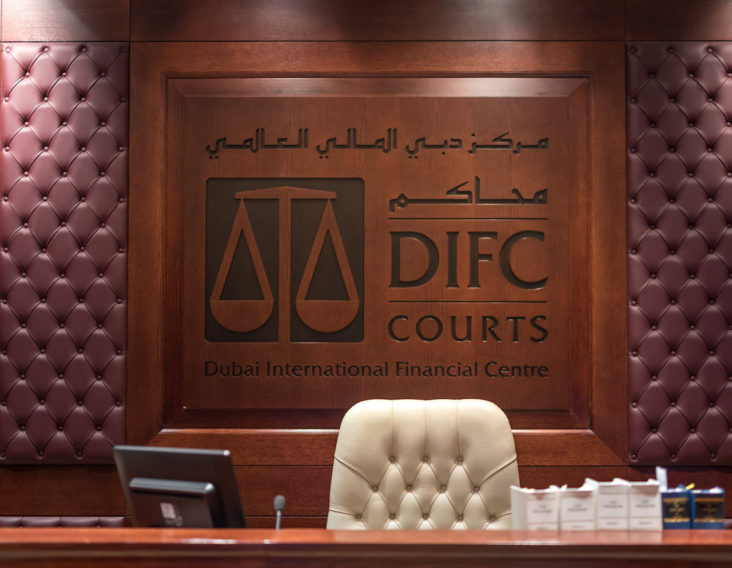Influx Of Cases At The DIFC Courts Powered By State-Of-The-Art Virtual Systems

The Dubai International Financial Centre (DIFC) Courts today released its annual figures for the full year of 2020, with total a volume of 882cases across all divisions.
commercial claims increase
The volume of cases of the main Court of First Instance (CFI) grew significantly in 2020, increasing by 41% year-on-year, signalling strong business confidence in the DIFC Courts. The total value of claims across all divisions rose by 72% from 2019, with AED 9.95 billion in claims value recorded. An average case value of AED 86.3 million was recorded across the CFI, which also includes the Technology & Construction Division (TCD) and Arbitration Division (ARB) cases.
Cases brought before the CFI covered a range of sectors including banking and finance, construction, and real estate, and involved disputes related to breach of contract, insolvency, arbitration agreements, employment, and public international law. There was also a noticeable increase in the number of opt-in cases in 2020, with 50% of claims in the CFI originating from parties electing to use the DIFC Courts to resolve their disputes.
Awareness of the DIFC Courts services was also bolstered by cooperation agreements signed in 2020 with Dubai FDI and Dubai Tourism, furthering strengthening a position as a major platform that supports Dubai’s continuing growth in FDI capital.
Reinforcing the Courts’ record of certainty for business through enforceable judgments, the total value of enforcement claims filed amounted to AED 1.1 billion in 2020, with 248 enforcement cases recorded.
SMALL CLAIMS TRIBUNAL (SCT)
The Small Claims Tribunal (SCT) recorded 466 cases in 2020, with47% of claims in the SCT originating from parties electing to use the DIFC Courts to resolve their disputes. Cases were driven primarily by breach of contract, which represented 51% of all cases in 2020, followed by employment (25%), property and tenancy (16%), and banking & finance (8%). Underlining the SCT’s increasing popularity for SME-related dispute resolution, the total value of claims recorded in 2020 was AED 55 million.
Zaki Azmi, Chief Justice, DIFC Courts, said: “Undoubtedly, 2020 was a year that tested the resilience of every government service, private sector business, and individual. It was a year that forced everyone to re-shift focus; to reprioritise, and, to adapt to rapid changes. Given the extraordinary circumstances that have emerged, all core services of the DIFC Courts have been fully maintained, whilst remaining true to our core values and dedication of public service. In this regard, the unwavering support of all the employees of the DIFC Courts must be acknowledged, with the Registry personnel and our IT Department demonstrating exceptional flexibility and dedication. Our long-established digital infrastructure not only preserved all services to court users in 2020, but also propelled the DIFC Courts to enhance operational efficiency inmanaging the substantial increase in claims, assisting businesses to resolve their disputes.
To best support the rise in cases filed at the DIFC Courts, I am proud to confirm that as well as reinforcing our current panel of judges with additional prominent international expertise, the DIFC Courts has further achieved a new milestone by appointing the next generation of Emirati judges with trans-systemic expertise across civil and common law.”
innovation powering service excellence
As a part of the UAE Government’s commitment to effectively employ advanced technologies and digital platforms to continue services to the public, the DIFC Courts leveraged its digital infrastructure to stay connected with court users during COVID-19 restrictions. Existing video conferencing and teleconferencing facilities for applications and hearings were extended, as well as the issuing of digital Orders and Judgments,and court users were able to access all extensive ‘eServices’ remotely.
During the pandemic the DIFC Courts also injected fresh digital systems for the registration of Wills; the new video conferencing facility can be accessed via a smartphone, tablet, or a desktop device. This new digital offering is in addition to an existing Virtual Registry, which allows those living overseas to create and register a DIFC Courts Will. Investors and former residents can access it from anywhere in the world and be connected, via video link, to a compliance officer sitting in Dubai.
Among the many technologies the courts has pioneered to re-engineer and increase access to justice, is the region’s first e-Registryin 2009, digitally integrated courtroom and state-of-the-art e-Court Management System (CMS) in 2017, as well as the region’s first ‘paperless’ e-bundling solution in 2018. Special project initiatives under the Courts of the Future have also assisted the DIFC Courts with advance R&D activities, uniting individuals and companies helping to prototype and launch the advancement of court technology, such as blockchain-powered initiatives, AI-enabled programmes and cloud-based solutions.
In 2020, the DIFC Courts also established its Arbitration Division, mandated to accommodate the rapidly increasing number of arbitration-related cases. Similar to the Technology & Construction Division (TCD) launched in 2017, the Arbitration Division leverages dedicated judicial and registry oversight and case management expertise.
Streamlining the arbitration-related cases under the new division has also led to increased efficiency of process, with the ability to swiftly review applications for interim measures and injunctive relief mechanisms. As a testament to the new division, the number of Arbitration-related cases increased by 46% in 2020. This rise was also accompanied by a surge of over 200% for the number of Technology & Construction Division (TCD) cases filed in 2020.
Away from the big picture, the DIFC Courts continued to support the work being done by Dubai’s legal community for those less fortunate than themselves. More than 115 lawyers helped provide legal support to over 300 people under the Pro Bono Programme in 2020.
In line with the social distancing requirements, our Pro Bono Programmecontinued to assist hundreds of individuals by connecting those in need with our volunteer legal professionals via our online consultation service. In addition, several initiatives aimed at alleviating costs for court users were introduced, including the suspension of all fees related to the e-Bundling service.
The full DIFC Courts Annual Report 2020 can be viewed at: https://www.difccourts.ae/media-centre/publications/annual-reports/difc-courts-annual-review-2020


